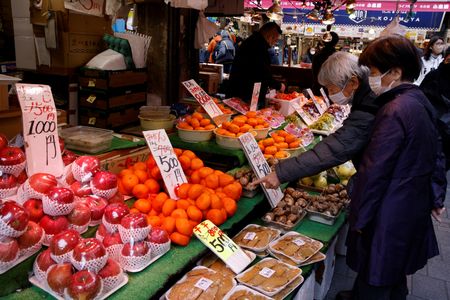 1
1 1
1
By Takahiko Wada and Leika Kihara
TOKYO (Reuters) -Japan’s core consumer inflation stayed well above the central bank’s 2% target in April and a key index stripping away the effects of fuel hit a fresh four-decade high, keeping alive expectations of a tweak to its massive stimulus this year.
The reading comes a few days after data showed the world’s third-largest economy grew faster than expected in the first quarter on a post-COVID consumer rebound.
While raw material costs have peaked, a steady rise in services and food prices highlight broadening inflationary pressure that may prod the Bank of Japan (BOJ) to revise up this year’s price forecast in July, analysts say.
“The BOJ will likely have little choice but to revise up its inflation forecast in July,” said Ryutaro Kono, chief Japan economist at BNP Paribas. “With inflation expectations heightening, the chance of a policy tweak may be rising.”
The nationwide core consumer price index (CPI), which excludes fresh food but includes energy items, rose 3.4% in April from a year earlier, data showed on Friday, matching a median market forecast and perking up from a 3.1% gain in March.
Services inflation accelerated to 1.7% in April from 1.5% in March, the data showed, suggesting that rising labour costs may be starting to feed into broader consumer inflation.
Food prices also jumped 9.0% in April from a year earlier, accelerating from 8.2% in March.
An index stripping away the effects of both fresh food and fuel – closely watched by the BOJ as a key barometer of domestic demand-driven price trends – rose 4.1% in April from a year earlier, marking the fastest annual pace since September 1981.
With inflation having stayed above its target for a year, markets are simmering with speculation the BOJ will soon phase out its massive stimulus that critics say is distorting markets and hurting financial institutions’ profits.
A scheduled increase in household electricity bills from June, which was approved on Tuesday, may keep core consumer inflation around 3% until summer, said Taro Saito, an economist at NRI Research Institute.
“Looking ahead, we’ll likely see more companies pass on rising labour costs reflecting recent hike wages,” he said. “The key driver of inflation will shift to services from goods.”
Ueda has stressed the need to keep ultra-loose policy until inflation is sustainably around 2% and accompanied by wage hikes.
He has also said core consumer inflation will slow back below 2% toward the middle of this fiscal year, though sustained price rises have put that view into some doubt.
A poll of analysts, released on Monday by think tank Japan Center for Economic Research, projects core consumer inflation to hit 2.3% in fiscal 2023. That is much higher than the BOJ’s current projection of 1.8% made in April.
The BOJ next meets for a policy meeting on June 15-16. It will revise its growth and inflation estimates at a subsequent meeting on July 27-28.
Analysts polled by Reuters expect Tokyo core consumer inflation, considered a leading indicator of nationwide trends, to hit 3.3% in May. The data is due out on May 26.
(Reporting by Takahiko Wada and Leika Kihara; Editing by Sam Holmes)